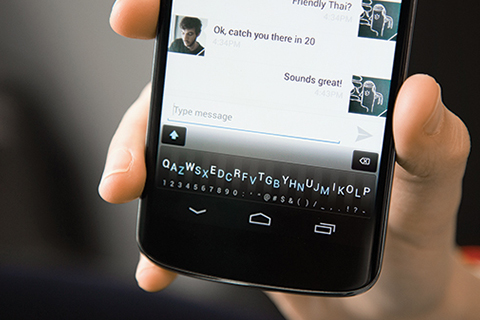Here’s an appealing idea for mobile device users: a smarter, more accurate keyboard that leaves more space on your touch screen.
Minuum is “the little keyboard for big fingers” created by Whirlscape – a tech company founded last June by Khai Truong, a University of Toronto professor of computer science, and Will Walmsley, who earned a master’s degree in applied science last year.
Minuum uses less than half the space of traditional virtual keyboards – without sacrificing keys for punctuation and backspacing. The keyboard uses a patent-protected auto-correction algorithm that allows for fast, accurate typing, even if the user is imprecise. The algorithm, based on Truong and Walmsley’s research into touch screens and wearable devices, understands the difference between what you type and what you mean, in real time – getting it right even if you miss every single letter. The keyboard can also be moved around the screen.
“While our mobile devices are becoming smarter and faster, the keyboard has coasted into the 21st century essentially unchanged from the days of the typewriter,” says Walmsley, the CEO of Whirlscape. “Realizing we could minimize the keyboard while maintaining accuracy was our eureka moment.”
Whirlscape launched a crowdfunding campaign on the website Indiegogo.com in March, aiming to raise $10,000 in a month. It raised twice that amount in the first day, and $87,000 in total. A beta version of the keyboard is expected to be available for campaign supporters to test this month. Walmsley says an Android keyboard app will launch first, followed by an iOS keyboard for developers to put into their iPhone and iPad apps. In the future, Walmsley envisions bringing simplified typing to wearable technology, such as smart watches and eyeglasses.
Because Minuum lays out its virtual keys in a single row (a continuum), users can type without needing a wide surface (imagine typing on the edge of a device, or on the rim of a pair of glasses). In fact, it’s possible to type using Minuum without any surface at all – for instance, if the device can measure the orientation of hand gestures in the air. This can be done in several ways, such as with an accelerometer or gyroscope in a ring, watch or armband – or with a camera capturing the hand, as happens with Microsoft Kinect and Google Glass.
Whirlscape received seed funding from U of T’s Early Stage Technology program and MaRS Innovation.
Watch a video on the Minuum, the “little keyboard for big fingers.”
Recent Posts
U of T’s Feminist Sports Club Is Here to Bend the Rules
The group invites non-athletes to try their hand at games like dodgeball and basketball in a fun – and distinctly supportive – atmosphere
From Mental Health Studies to Michelin Guide
U of T Scarborough alum Ambica Jain’s unexpected path to restaurant success
A Blueprint for Global Prosperity
Researchers across U of T are banding together to help the United Nations meet its 17 sustainable development goals





